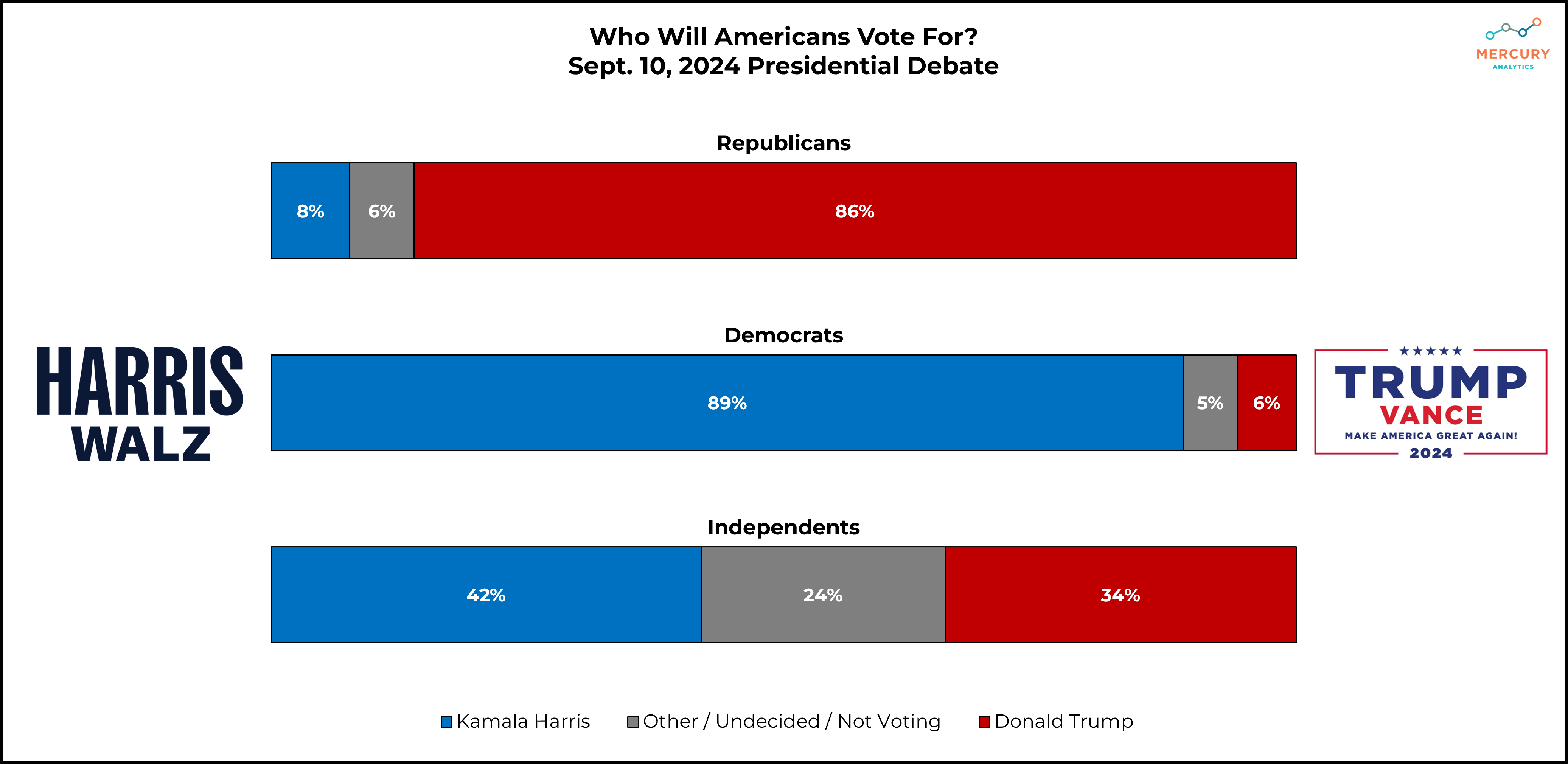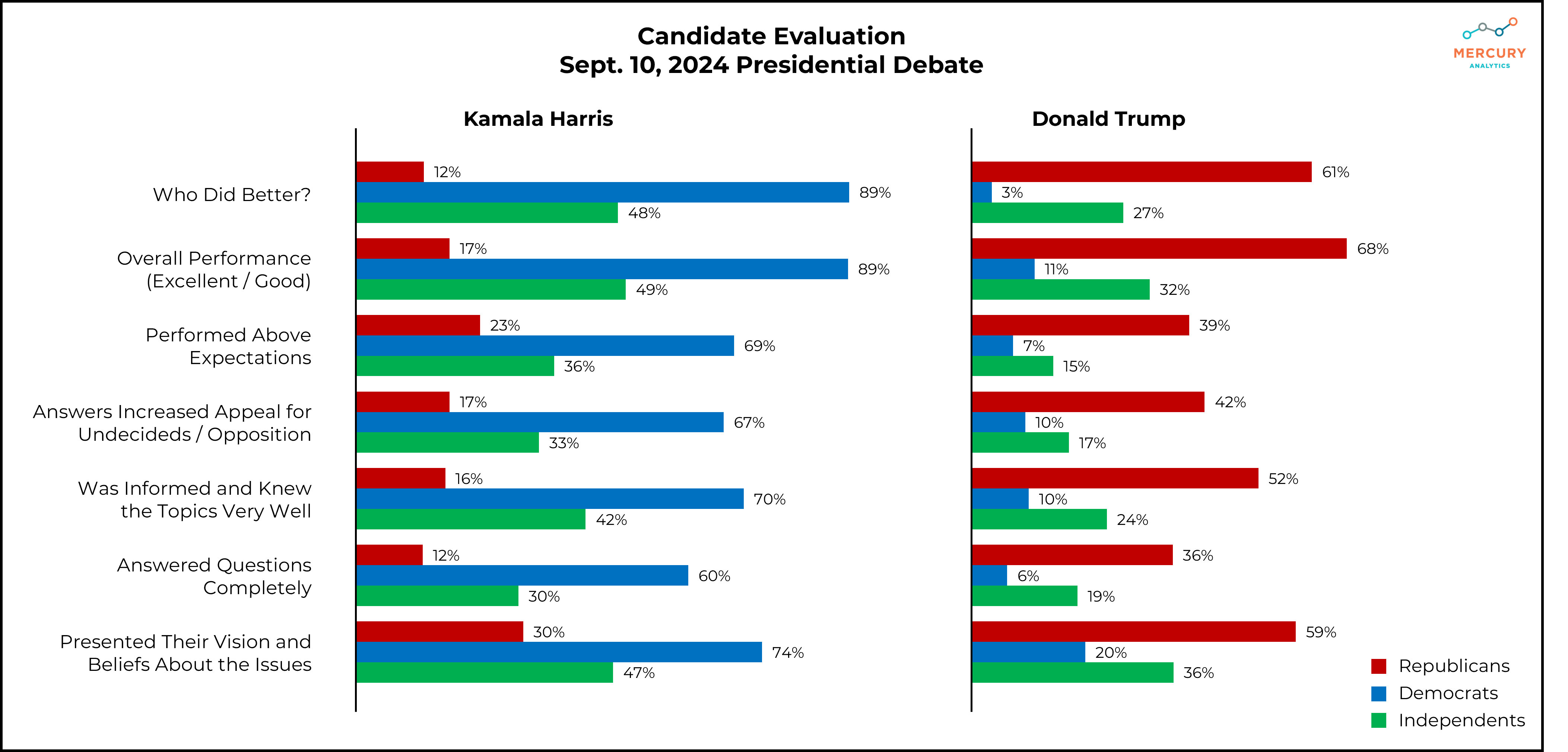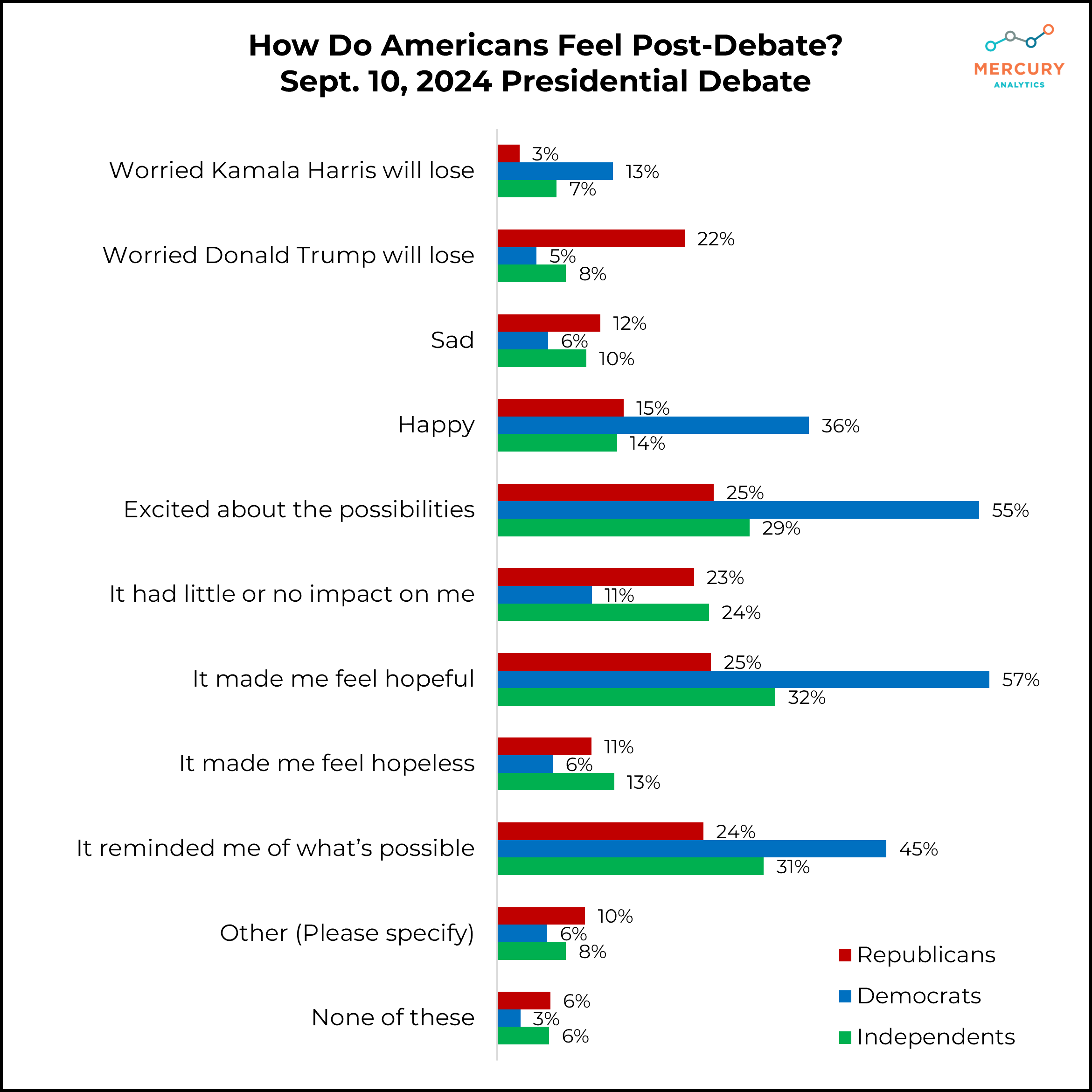Election 2024: Presidential Debate
Overnight National Research Among n1258 Likely Voters
On September 10, 2024, the first presidential debate between Vice President Kamala Harris and former President Donald Trump took place at the National Constitution Center in Philadelphia, PA.

THE SETTING
Mercury Analytics conducted an overnight survey including dial-tests of the presidential debate between Vice President Kamala Harris and former President Donald Trump, which took place on September 10th, 2024 at Philadelphia’s National Constitution Center. After President Joe Biden dropped out of the presidential race earlier this year and endorsed Vice President Kamala Harris as the Democratic nominee, this debate provided an opportunity for the two candidates to meet in an intimate setting for the first time, without an in-person audience.
This debate’s format followed similar rules to the June 2024 debate between President Joe Biden and former President Trump. The candidates forwent opening statements and began answering questions immediately, with 2 minutes allotted for responses, 2 minutes allotted for rebuttals, and 1 additional minute for follow-ups or clarifications. Candidates were not allowed to ask each other questions and their microphones were muted when not speaking. At the end, the candidates were given 2 minutes for brief closing statements. The debate also featured two commercial breaks (during which candidates were not allowed to interact with their staff) and the debate was not filmed in front of a live audience.
The debate started at 9:00 p.m. ET and consisted of 12 segments dedicated to various topics affecting the United States. ABC News’s David Muir and Linsey Davis moderated the presidential debate, and asked the candidates questions on the following topics: Economy, Abortion, Immigration, Fracking, Peaceful Transfer of Power, Israel & Hamas, Russia & Ukraine, Afghanistan, Race & Ethnicity, Healthcare, Climate Change, and Closing Statements.
Mercury’s study tested the candidates’ performance among a national sample of n=1258 likely voters. Respondents were first asked a series of demographic questions followed by questions to help understand respondents’ current views on politics in America, and specifically regarding Vice President Kamala Harris and former President Trump. Some respondents were directed to a quick poll gauging their reactions to the debate, while others participated in a dial test exercise in which they were shown short clips from the debate and asked to provide moment-to-moment reactions.
As participants watched the video, they moved a slider just below the video to the right the more strongly they agreed with what they were seeing and hearing, or to the left the more strongly they disagreed. Before the close of the survey, respondents were asked post-exposure questions to assess their reactions to both candidates’ performance in the debate, and data was analyzed with the assistance of MercuryAI.
MercuryAI is an OpenAI-powered research platform designed for rapid, in-depth analysis of quantitative and qualitative data, enabling users to quickly and easily produce a high-level topline summary with just a few clicks, or dive deeper into qualitative information to define key themes and takeaways.
Integrated into the Mercury Analytics Workbench, MercuryAI provides comprehensive insight into quantitative research, open-end verbatims, focus groups, and interviews or IDIs while maintaining data integrity and keeping proprietary information secure.
For more information on Mercury’s dial-testing or MercuryAI, click here, and for more technical information about the study, please contact Jordan Kraft or at 202-386-6322 x 322.
Election 2024: VP Kamala Harris vs. Former President Donald Trump
Last night’s debate provided America with the opportunity to hear both presidential candidates outline and defend their values, beliefs, and goals for their presidency. It also marked the first time that Vice President Kamala Harris and former President Donald Trump met face-to-face.
The results of our study reveal deeply-entrenched partisan views, with the results underscoring significant divides across Republican, Democrat, and Independent voters. While full of fierce, note-worthy moments, the debate ultimately did not make a meaningful impact on which candidate viewers support, suggesting it will take more than a strong performance to change minds.
Republican Support for Trump Remains Solid
Among Republicans, Donald Trump’s debate performance was met with strong approval, with 68% rating it as either “Excellent” or “Good.” Nearly 90% of his base stated he performed “as expected” or “above expectations,” further cementing his status among his supporters. Trump’s messaging on immigration and border security, and his track record on economic issues, resonated powerfully, reinforcing his leadership credentials within his party.
However, Trump’s performance did little to sway Democrats or Independent voters. Democrats overwhelmingly disapproved of his debate performance, with 73% describing it as “Not very good” or “Terrible”. Many Democrats criticized his combative demeanor, accusing him of focusing more on personal attacks than on substantive policy discussions. Independent voters were split — 38% rated Trump’s performance poorly, while 32% viewed it favorably. Some Independents appreciated his direct communication style, while others were turned off by his lack of detailed policy proposals.
Harris Impresses Democrats But Faces Mixed Reviews From Independents
Kamala Harris received strong marks from Democrats, with an overwhelming 89% rating her performance positively. Harris was praised for her composure, preparedness, and ability to fact-check Trump, particularly on social issues such as women’s rights and economic justice. Her calm demeanor and professional conduct during the debate were frequently highlighted as key strengths.
Republicans, however, were less impressed. Nearly half of them rated Harris’s performance negatively, citing concerns over what they perceived as evasiveness and rehearsed responses. Among Independents, Harris’s performance received more mixed reactions — 49% rated her performance positively, but many felt she failed to provide direct answers to critical questions. Still, 36% of Independents said Harris exceeded their expectations, suggesting that her strong debate skills won over some previously skeptical voters.
Independent Voters Hold the Key
Independent voters emerged as a pivotal group, divided in their assessments of both candidates. With 42% of Independents definitely or likely voting for Harris and 34% voting for Trump in the upcoming election, the results illustrate the crucial role Independents will play in deciding the outcome of November’s election.
When it comes to resonating with undecided or Trump voters, Harris appears to have an edge according to Democrats, with 67% believing her performance increased her appeal to these voters. However, only 33% of Independents and 17% of Republicans agreed. Trump appears to be slightly less successful in this aspect, even to his own party – just 42% of Republicans believe he expanded his appeal to undecided / Harris voters, and even fewer Independents (17%) and Democrats (10%) expressed similar sentiments.
Emotional Reactions Highlight Partisan Divides
Emotional responses to the debate further highlighted the polarized political climate. Among Democrats, over half felt “hopeful” and “excited” about the future. Republicans, meanwhile, displayed more cautious optimism — 25% felt “excited” about Trump’s prospects, but 22% expressed worry that he could lose. Independent voters exhibited a broader range of emotions, with 29% feeling “excited” and 32% “hopeful,” but many remained concerned about the performance of both candidates.
Looking Forward to November
The discourse surrounding last night’s debate provides a stark view of the partisan divisions shaping this election cycle. Both Trump and Harris have strong backing within their respective parties, but winning over Independent voters remains a crucial challenge for both candidates. The race for the White House remains neck-and-neck, and the ability of each candidate to sway undecided voters could ultimately determine the outcome of the election. The emotional and polarized reactions to the debate further underline the complexities of the current political landscape, where the battle for hearts and minds extends well beyond traditional party lines.
How Americans Feel Post-Debate
Q: After watching the debate, how do you feel? Please select all that apply.
let's connect today.
better technology. better insights. better decisions.

1120 20TH ST NW. SUITE 350
WASHINGTON, DC 20036
202.386.6322 EXT 2
Reach out
© 2025 Mercury Analytics, All Rights Reserved | Privacy Policy



